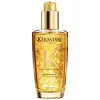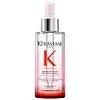What's inside
What's inside
 Key Ingredients
Key Ingredients

 Benefits
Benefits

 Concerns
Concerns

 Ingredients Side-by-side
Ingredients Side-by-side

Cyclopentasiloxane
EmollientDimethiconol
EmollientZea Mays Germ Oil
EmollientArgania Spinosa Kernel Oil
EmollientSclerocarya Birrea Seed Oil
HumectantCamellia Oleifera Seed Oil
Skin ConditioningPentaclethra Macroloba Seed Oil
EmollientCaprylic/Capric Triglyceride
MaskingLinalool
PerfumingAlpha-Isomethyl Ionone
PerfumingLimonene
PerfumingCoumarin
PerfumingBenzyl Alcohol
PerfumingPhyllanthus Emblica Fruit Extract
HumectantTocopherol
AntioxidantParfum
MaskingCyclopentasiloxane, Dimethiconol, Zea Mays Germ Oil, Argania Spinosa Kernel Oil, Sclerocarya Birrea Seed Oil, Camellia Oleifera Seed Oil, Pentaclethra Macroloba Seed Oil, Caprylic/Capric Triglyceride, Linalool, Alpha-Isomethyl Ionone, Limonene, Coumarin, Benzyl Alcohol, Phyllanthus Emblica Fruit Extract, Tocopherol, Parfum
Water
Skin ConditioningAlcohol Denat.
AntimicrobialArginine
MaskingPEG-40 Hydrogenated Castor Oil
EmulsifyingCitric Acid
BufferingNiacinamide
SmoothingCalcium Pantothenate
Caffeine
Skin ConditioningLimonene
PerfumingPyridoxine Hcl
Skin ConditioningLinalool
PerfumingPolyquaternium-11
Safflower Glucoside
Benzyl Salicylate
PerfumingCoumarin
PerfumingCitral
PerfumingBenzyl Alcohol
PerfumingXylitylglucoside
HumectantCitronellol
PerfumingBenzyl Benzoate
AntimicrobialAnhydroxylitol
HumectantXylitol
HumectantZingiber Officinale Water
MaskingZingiber Officinale Root Extract
MaskingResveratrol
AntioxidantTocopherol
AntioxidantBHT
AntioxidantSodium Citrate
BufferingParfum
MaskingWater, Alcohol Denat., Arginine, PEG-40 Hydrogenated Castor Oil, Citric Acid, Niacinamide, Calcium Pantothenate, Caffeine, Limonene, Pyridoxine Hcl, Linalool, Polyquaternium-11, Safflower Glucoside, Benzyl Salicylate, Coumarin, Citral, Benzyl Alcohol, Xylitylglucoside, Citronellol, Benzyl Benzoate, Anhydroxylitol, Xylitol, Zingiber Officinale Water, Zingiber Officinale Root Extract, Resveratrol, Tocopherol, BHT, Sodium Citrate, Parfum
 Reviews
Reviews

Ingredients Explained
These ingredients are found in both products.
Ingredients higher up in an ingredient list are typically present in a larger amount.
Benzyl Alcohol is most commonly used as a preservative. It also has a subtle, sweet smell. Small amounts of Benzyl Alcohol is not irritating and safe to use in skincare products. Most Benzyl Alcohol is derived from fruits such as apricots.
Benzyl Alcohol has both antibacterial and antioxidant properties. These properties help lengthen the shelf life of products. Benzyl Alcohol is a solvent and helps dissolve other ingredients. It can also improve the texture and spreadability.
Alcohol comes in many different forms. Different types of alcohol will have different effects on skin. This ingredient is an astringent alcohol.
Using high concentrations of these alcohols are drying on the skin. They may strip away your skin's natural oils and even damage your skin barrier. Astringent alcohols may also irritate skin.
Other types of astringent alcohols include:
According to the National Rosacea Society based in the US, you should be mindful of products with these alcohols in the top half of ingredients.
Any type of sanitizing product will have high amounts of alcohol to help kill bacteria and viruses.
Learn more about Benzyl AlcoholCoumarins are a group of substances found naturally in plants. There are over 1300 types of coumarins identified. It has a natural vanilla scent.
Coumarin is an identified EU known allergy, meaning it may cause an allergic reaction when applied to the skin.
In many countries, coumarin is banned as a food additive. However, it can be found in soaps, tobacco products, and some alcohol drinks.
Plants use coumarins as a chemical defense. Some plants that have coumarins include lavender, tonka beans, and yellow clovers.
Learn more about CoumarinLimonene is a fragrance that adds scent and taste to a formulation.
It's found in the peel oil of citrus fruits and other plants such as lavender and eucalyptus. The scent of limonene is generally described as "sweet citrus".
Limonene acts as an antioxidant, meaning it helps neutralize free radicals.
When exposed to air, oxidized limonene may sensitize the skin. Because of this, limonene is often avoided by people with sensitive skin.
The term 'fragrance' is not regulated in many countries. In many cases, it is up to the brand to define this term. For instance, many brands choose to label themselves as "fragrance-free" because they are not using synthetic fragrances. However, their products may still contain ingredients such as essential oils that are considered a fragrance.
Learn more about LimoneneLinalool is a fragrance and helps add scent to products. It's derived from common plants such as cinnamon, mint, citrus, and lavender.
Like Limonene, this ingredient oxidizes when exposed to air. Oxidized linalool can cause allergies and skin sensitivity.
This ingredient has a scent that is floral, spicy tropical, and citrus-like.
Learn more about LinaloolParfum is a catch-all term for an ingredient or more that is used to give a scent to products.
Also called "fragrance", this ingredient can be a blend of hundreds of chemicals or plant oils. This means every product with "fragrance" or "parfum" in the ingredients list is a different mixture.
For instance, Habanolide is a proprietary trade name for a specific aroma chemical. When used as a fragrance ingredient in cosmetics, most aroma chemicals fall under the broad labeling category of “FRAGRANCE” or “PARFUM” according to EU and US regulations.
The term 'parfum' or 'fragrance' is not regulated in many countries. In many cases, it is up to the brand to define this term.
For instance, many brands choose to label themselves as "fragrance-free" because they are not using synthetic fragrances. However, their products may still contain ingredients such as essential oils that are considered a fragrance by INCI standards.
One example is Calendula flower extract. Calendula is an essential oil that still imparts a scent or 'fragrance'.
Depending on the blend, the ingredients in the mixture can cause allergies and sensitivities on the skin. Some ingredients that are known EU allergens include linalool and citronellol.
Parfum can also be used to mask or cover an unpleasant scent.
The bottom line is: not all fragrances/parfum/ingredients are created equally. If you are worried about fragrances, we recommend taking a closer look at an ingredient. And of course, we always recommend speaking with a professional.
Learn more about ParfumTocopherol (also known as Vitamin E) is a common antioxidant used to help protect the skin from free-radicals and strengthen the skin barrier. It's also fat soluble - this means our skin is great at absorbing it.
Vitamin E also helps keep your natural skin lipids healthy. Your lipid skin barrier naturally consists of lipids, ceramides, and fatty acids. Vitamin E offers extra protection for your skin’s lipid barrier, keeping your skin healthy and nourished.
Another benefit is a bit of UV protection. Vitamin E helps reduce the damage caused by UVB rays. (It should not replace your sunscreen). Combining it with Vitamin C can decrease sunburned cells and hyperpigmentation after UV exposure.
You might have noticed Vitamin E + C often paired together. This is because it is great at stabilizing Vitamin C. Using the two together helps increase the effectiveness of both ingredients.
There are often claims that Vitamin E can reduce/prevent scarring, but these claims haven't been confirmed by scientific research.
Learn more about Tocopherol